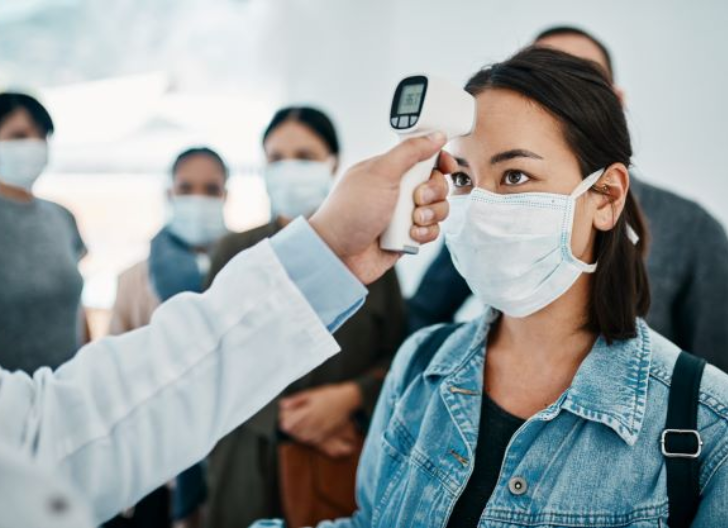COVID-19 ADA Accommodation Challenges
The NBI Team

As workplaces continue to open up and move away from quarantine restrictions, employers will face many legal challenges. While every working environment is different and employee needs can vary, employers must find solutions that adhere to various federal, state, and local laws related to COVID-19. ADA-covered employers — generally those with 15 or more employees — also need to ensure that they have strategies in place to offer accommodations to workers who may be at high risk for complications from the virus.
What Basic Safety Measures Can Employers Take That Don't Violate the ADA?
There are many considerations employers need to think about before reopening their workplaces. Not only must they follow OSHA guidelines, but they also need to understand what safety measures they can take without violating the ADA. OSHA recommends that employers implement basic safety measures, like encouraging sick workers to stay home and developing policies to identify and isolate sick employees.
The EEOC, which enforces the ADA, has provided specific guidance to employers to help reduce COVID-19 risks. For example, employers may perform screening measures as long as they are “job related and consistent with business necessity.” The EEOC further provides that testing administered pursuant to CDC guidance will meet the ADA’s “business necessity” standard. In certain circumstances, employers may even bar employees from entering the workplace who refuse to submit to a temperature check policy.
What are Employers Allowed to Ask About Health Conditions?
Employers can ask employees certain questions during the pandemic without violating the ADA. However, health information must be confidential to ensure ADA and HIPAA compliance. An employer can ask employees whether they are experiencing specific virus symptoms, or even whether they've been tested for COVID-19 if they are entering the workplace. If an employee was out sick, the ADA permits employers to request a doctor's note clearing the employee to return to work, but they may not require an antibody test.
Employers must be cautious when conducting questioning about COVID-19 to ensure they comply with the law. While they are generally allowed to question all employees, employers must have a reasonable belief that the particular employee might be sick if they do choose to question a specific individual. Employers are also not permitted to ask questions about employees' family members. More information about what kinds of questions employers can and can't ask is discussed in the NBI course, Reopening the Workplace: Employee Well-Being & Litigation Risks.
What Kinds of Reasonable Accommodations Does an Employer Need to Offer?
An employer must provide reasonable accommodations to employees concerned about being exposed to the virus in the workplace. Unless the request places an undue hardship on the employer, they must consider it. As it relates to COVID-19, ADA protection generally applies to individuals with pre-existing or chronic medical conditions that would place them at high risk for coronavirus complications.
Under the ADA, if an individual with a disability requests an accommodation, they may not be excluded from the workplace solely on the basis that they are at higher risk for COVID-19 complications. However, the ADA recognizes a "direct threat" exception to the reasonable accommodation rule. If a health or safety risk cannot be reduced or eliminated by offering reasonable accommodation, an employer might be able to avoid liability for an ADA violation under this exception. An employer must consider a four-prong test in determining whether an employee's disability could pose a "direct threat" to their health or that of others, including 1) the duration of the risk, 2) the nature and severity of the potential harm, 3) the likelihood harm will occur, and 4) the imminence of the potential harm.
Depending on the nature of the job or work environment, reasonable accommodations might include solutions such as flexible workplace options (e.g., telework), installing protective shields, modifying work schedules, restructuring job duties, and staggering workstations to ensure physical distance.
Employer Challenges to Privacy Laws Under the ADA
HIPAA regulations and the ADA both prohibit an employer from disclosing confidential health information. Any employer who conducts temperature checks, makes COVID-19-related inquiries, or discusses virus symptoms with employees must ensure that the data remains private.
Although employers can collect certain health information on their employees in light of the ongoing pandemic to reduce infection risk, employers must be aware of HIPAA and ADA regulations. Employers are generally not allowed to disclose the identity of an individual who has tested positive for COVID-19. In addition, an employee's medical record and any medical information collected on them, including temperature check data and testing results, must be kept in a confidential file separate from their standard personnel file.
--
This blog post is for general informative purposes only and should not be construed as legal advice or a solicitation to provide legal services. You should consult with an attorney before you rely on this information. While we attempted to ensure accuracy, completeness and timeliness, we assume no responsibility for this post’s accuracy, completeness or timeliness.
